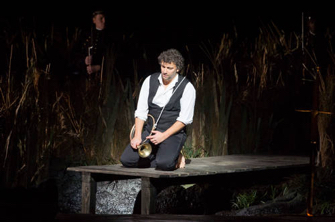Richard Wagner’s Lohengrin, currently on stage at the Bastille Opera, is an extraordinary thing. Written in 1850, when the composer was still in his 30s, it marks the end of what one might call the trio of his youthful operas (the other two being The Flying Dutchman and Tannhaüser).
In many ways, it points back to the era of grand romantic opera, with a number of set-piece arias and duets, yet in so many other respects the musical idiom and the use of medieval/mythological themes look forward to the great works of his maturity: Lohengrin is the son of Parsifal, whose own tale would be the subject of Wagner’s final opera, and at one point even the Norse gods Wotan and Freia, who would form such an integral part of the Ring Cycle, are evoked.
Lohengrin is truly a work at the crossroads. I would even be tempted to call it a work about crossroads, about being in an in-between state.
If one were to be generous about Claus Guth’s current staging in Paris, it is possible that he envisages the mysterious Knight, who cannot reveal his name and who comes to save Elsa of Brabant from accusations of murdering her brother, in a similar way: Lohengrin seems here to be neither hero nor anti-hero; he certainly appears reluctant to assume the mantle of mystical savior.
Instead of first appearing in a boat drawn by a swan (usually an exciting visual challenge for a stage director), he is first seen curled up in a fetal position, with a few falling feathers the only sign of how he got there in the first place. The wonderful tenor Jonas Kaufmann, who has to sing his first few lines in this position and whose voice sounded somewhat strained and muffled as a result, must have been cursing such directorial decisions.
Fortunately for the audience, Kaufmann was allowed to perform upright for most of the remaining hours of the performance, and we were treated to a vocal masterclass. Any anxieties following the singer’s prolonged bout of ill health (he had to cancel a number of performances of other roles during the past year) were dispelled by the beauty, technical security and interpretative subtlety of his voice.
Instead of setting the opera in the 10th century, Guth has followed what seems to be the current directorial fad by updating it to around the time of the work’s composition. Often such modernizing can convey something profound or unexpected about a work, but I found the mid-19th century setting here singularly unenlightening.
The addition on stage of a piano or a representation of a keyboard in each of the three acts might conceivably pay tribute to those like the poet Charles Baudelaire who viewed Lohengrin as incarnating the mysteries of Art, but the recurrent visual presence of Elsa and her brother (complete with half a wing of feathers) as children proved more irritating than thought-provoking.
From a musical angle, the three-tiered buildings used at the back of the stage allowed both chorus and brass players maximal sonic impact, and the quality of the music-making was mostly superb. After an initially hesitant beginning, conductor Philippe Jourdain elicited some glorious sounds from the Orchestre de l’Opéra de Paris, particularly the silky string sounds produced in the second act and a wonderfully energetic rendering of the Act III prelude (coming just before the famous wedding march).

Austrian soprano Martina Serafin certainly looked the part of the virginal, incandescent Elsa. After being concerned by some tuning issues at the beginning of the opera, I grew to appreciate the grittiness in her voice, which gave her portrayal added depth.
Wolfgang Koch was appropriately menacing as Telramund and, if Evelyn Herlitzius as Telramund’s wife Ortrud lacked the necessary vocal heft for the role, her performance had a thrilling intensity to it, not least in the chilling Act II duet when she tries to persuade Elsa to force Lohengrin to reveal his identity.
The great Wagnerian bass René Pape represents luxury casting at its best in the role of King Heinrich der Vogleur; this part does not ask for anything near the complexity of a character like Gurnemanz in Parsifal (one of Pape’s iconic roles), but he gave a rendition oozing with vocal authority.
In the end, however, the opera truly belongs to Kaufmann in the title role. His singing of the final-act Grail Narration in particular was impeccably nuanced.
Favorite
